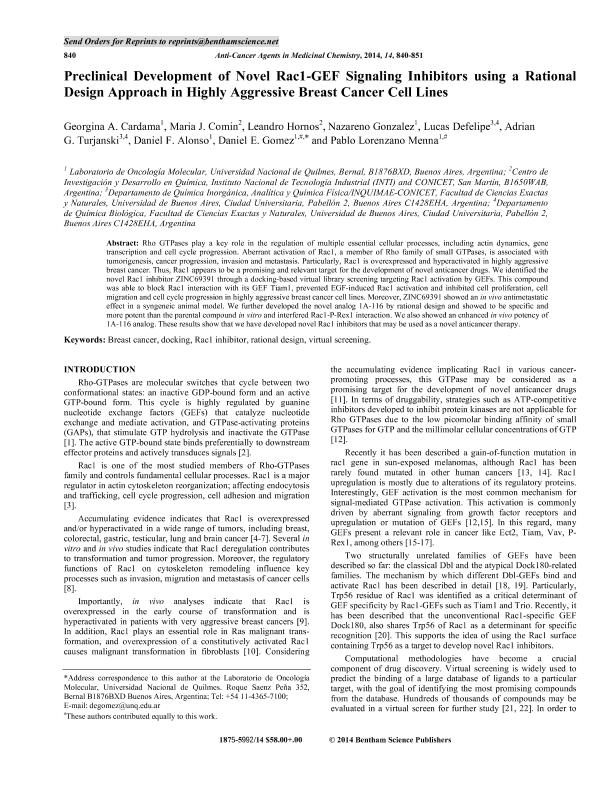Artículo
Preclinical development of novel Rac1-GEF signaling inhibitors using a rational design approach in highly aggressive breast cancer cell lines
Cardama, Georgina Alexandra ; Comin, Maria Julieta
; Comin, Maria Julieta ; Hornos, Leandro; González, Nazareno
; Hornos, Leandro; González, Nazareno ; Defelipe, Lucas Alfredo
; Defelipe, Lucas Alfredo ; Turjanski, Adrian
; Turjanski, Adrian ; Alonso, Daniel Fernando
; Alonso, Daniel Fernando ; Gomez, Daniel Eduardo
; Gomez, Daniel Eduardo ; Lorenzano Menna, Pablo
; Lorenzano Menna, Pablo
 ; Comin, Maria Julieta
; Comin, Maria Julieta ; Hornos, Leandro; González, Nazareno
; Hornos, Leandro; González, Nazareno ; Defelipe, Lucas Alfredo
; Defelipe, Lucas Alfredo ; Turjanski, Adrian
; Turjanski, Adrian ; Alonso, Daniel Fernando
; Alonso, Daniel Fernando ; Gomez, Daniel Eduardo
; Gomez, Daniel Eduardo ; Lorenzano Menna, Pablo
; Lorenzano Menna, Pablo
Fecha de publicación:
09/2013
Editorial:
Bentham Science Publishers
Revista:
Anti-cancer Agents In Medicinal Chemistry
ISSN:
1871-5206
Idioma:
Inglés
Tipo de recurso:
Artículo publicado
Clasificación temática:
Resumen
Rho GTPases play a key role in the regulation of multiple essential cellular processes, including actin dynamics, gene transcription and cell cycle progression. Aberrant activation of Rac1, a member of Rho family of small GTPases, is associated with tumorigenesis, cancer progression, invasion and metastasis. Particularly, Rac1 is overexpressed and hyperactivated in highly aggressive breast cancer. Thus, Rac1 appears to be a promising and relevant target for the development of novel anticancer drugs. We identified the novel Rac1 inhibitor ZINC69391 through a docking-based virtual library screening targeting Rac1 activation by GEFs. This compound was able to block Rac1 interaction with its GEF Tiam1, prevented EGF-induced Rac1 activation and inhibited cell proliferation, cell migration and cell cycle progression in highly aggressive breast cancer cell lines. Moreover, ZINC69391 showed an in vivo antimetastatic effect in a syngeneic animal model. We further developed the novel analog 1A-116 by rational design and showed to be specific and more potent than the parental compound in vitro and interfered Rac1-P-Rex1 interaction. We also showed an enhanced in vivo potency of 1A-116 analog. These results show that we have developed novel Rac1 inhibitors that may be used as a novel anticancer therapy. © 2014 Bentham Science Publishers.
Palabras clave:
Breast Cancer
,
Docking
,
Rac1 Inhibitor
,
Rational Design
,
Virtual Screening
Archivos asociados
Licencia
Identificadores
Colecciones
Articulos(INQUIMAE)
Articulos de INST.D/QUIM FIS D/L MATERIALES MEDIOAMB Y ENERGIA
Articulos de INST.D/QUIM FIS D/L MATERIALES MEDIOAMB Y ENERGIA
Articulos(SEDE CENTRAL)
Articulos de SEDE CENTRAL
Articulos de SEDE CENTRAL
Citación
Cardama, Georgina Alexandra; Comin, Maria Julieta; Hornos, Leandro; González, Nazareno; Defelipe, Lucas Alfredo; et al.; Preclinical development of novel Rac1-GEF signaling inhibitors using a rational design approach in highly aggressive breast cancer cell lines; Bentham Science Publishers; Anti-cancer Agents In Medicinal Chemistry; 14; 6; 9-2013; 840-851
Compartir
Altmétricas



